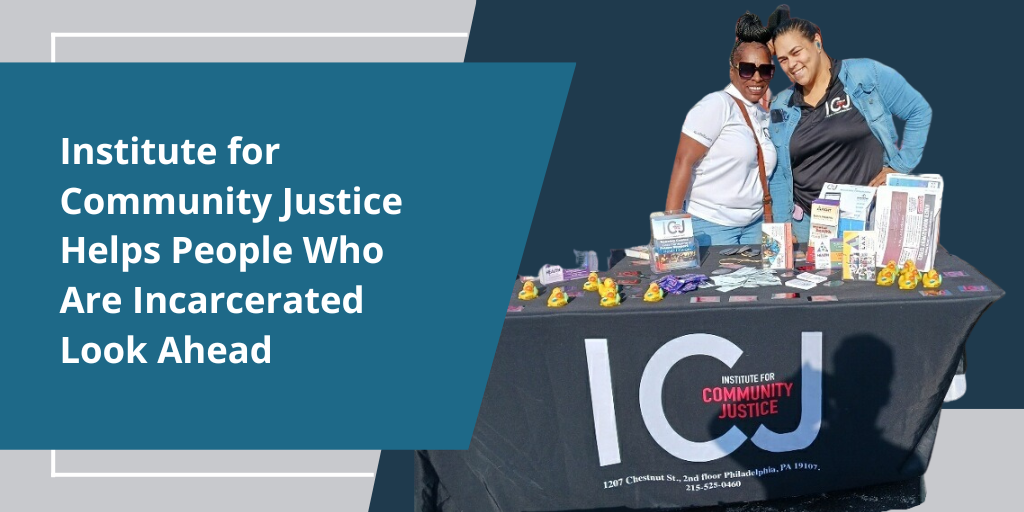Empowerment, not enablement, is a mantra at Philadelphia’s Institute for Community Justice (ICJ), a comprehensive prison services and reentry program that provides health linkages, supportive services, education, and advocacy for individuals, families, and communities impacted by mass incarceration. As part of Philadelphia FIGHT—a comprehensive health services organization for people living with and at high risk of HIV/AIDS—ICJ focuses specifically on individuals involved in the justice system.
“There are so many barriers for returning citizens,” says Program Director Kelly Rascoe. “What ICJ does is help navigate those barriers. Starting when they are still incarcerated, we discuss, ‘Do you need identification? How will you eat? Where will you sleep? Can you find a job?’ Then we give them tools to design their own freedom.”
Pre-entry Programming for a Successful Transition
ICJ has a multi-pronged approach to providing pre-entry supports to individuals who are incarcerated in Pennsylvania’s state and county correctional facilities. This includes the Reentry Wellness and Work Readiness Initiative (RWIN) at Chester State Correctional Institute and individual case management for residents at other Pennsylvania state prisons. ICJ’s pre-entry support is focused on helping individuals who are incarcerated prepare for the demands and requirements of life outside of prison. “The way we see it, reentry planning starts the day you are incarcerated,” says Gina Mencarelli, assistant to the director and program support coordinator. “Preparation is so important for being successful in reentry, both in terms of material needs, and also mental and physical needs.”
The RWIN program typically runs between 8 and 14 weeks, with a team from ICJ going into the prison in 2-hour blocks to work with residents who are within 18 months of release. They talk through needs relating to mental health, work readiness, housing, and other issues. Participants have a lot of face time with ICJ staff to work through each person’s unique concerns. For instance, individuals who have been incarcerated for a long time may need to learn how a smartphone works, how to use popular apps, and what modern workplaces are like.
ICJ’s individual case management takes a similar personalized approach. “We give people whatever support they need to get ready to come home, from soft skills to finding a place to live,” says Khia Naylor, Community Liaison Job Developer. When a person is referred to ICJ for pre-entry services, Naylor and her colleagues send out a detailed intake survey to assess the individual’s housing, employment, health care and other needs. They then have Zoom call with the person and their social worker to start building a comprehensive re-entry plan.
ICJ often works with individuals’ families, as well, to help them prepare for their loved one’s return to their home and community. There is a misconception that families often don’t want anything to do with a person coming out of incarceration, says the IJC team, but in fact they have seen the opposite. Many families want to support their loved one but just don’t know how to coordinate with parole, probation, transportation, and other services and requirements.
Holistic and Individualized Approach to Reentry
Upon release from incarceration, most ICJ participants visit their case manager onsite at Philadelphia FIGHT’s offices within about 2 days. Every individual receiving case management services undergoes a behavioral health screening, and nearly every person has either a formal diagnosis or self-identifies as having post-traumatic stress disorder or trauma. Through Philadelphia FIGHT, participants can receive mental health treatment, along with physical and dental care if needed, right on site. People experiencing a mental health crisis or with more intense substance use or mental health needs are referred to a vast network of providers.
ICJ’s case managers continue to support individuals for as long as they need. “We are always available to help folks figure out how to get themselves what they need to stay well and integrated into their communities,” says Naylor. “And their community is our community,” she notes. “Many of us live in the same neighborhoods as some of the people we serve and see them out there living their lives just as we are.” Additionally, around 87 percent of ICP staff have lived experience of themselves or a loved one being incarcerated, bringing an important perspective about what it takes to succeed after incarceration. IJC participants have about a 16 percent recidivism rate, compared to a 34 percent recidivism rate for all of Philadelphia.[i] And ICJ is the only service organization in Philadelphia that has zero exclusion criteria for services. “We don’t care what they did or how long they were in prison for,” says Rascoe. “We are all about looking forward and giving everyone their best chance.”
More Information
For more information, read about David’s reentry journey with Philadelphia FIGHT.
References
[i] How We Help. Institute for Community Justice. (icjphilly.org)
Like what you’ve read? Sign up to receive the monthly GAINS eNews!


